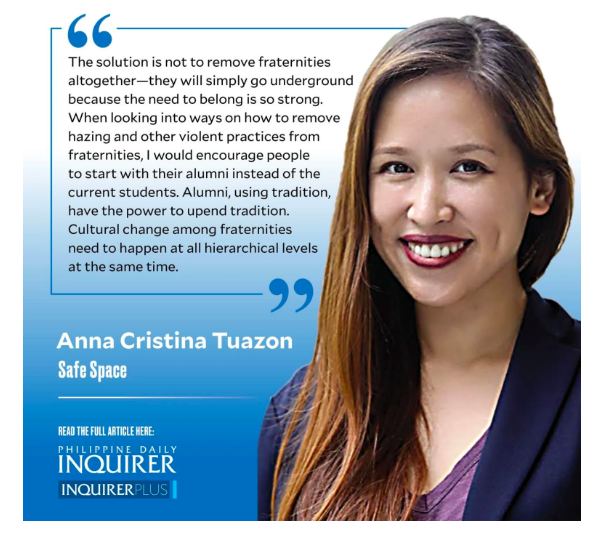‘Just following tradition’
That was the reason offered by Tau Gamma Phi Adamson University chapter leader, Tung Cheng Teng Jr., when asked at a Senate hearing, investigating the death of student John Matthew Salilig, as to why they continue engaging in hazing despite the anti-hazing law.
Government officials publicly express shock and condemnation, as if most of them are not affiliated with a fraternity themselves. Not a few of them have established family legacies within fraternities (and in politics), another example of how culture among fraternities is laced with multigenerational tradition.
Why is it that tradition runs deeper than even the threat of severe consequences, such as expulsion and jail time? What makes educated young men with high aspirations risk their futures to undergo violent rituals
The question that is not being asked in both government hearings and in media is this: What does someone gain by entering a fraternity, enough for hazing to be “worth it?” If someone is willing to risk losing a lot, it means they will be gaining a lot as well.
The need to belong is a strong psychological need, with the urge to affiliate with a group peaking in adolescence and young adulthood. We form our sense of self in relation to others—groups we belong to become part of our identity. For example, most people are proud to identify with their barkada, school, religion, region, or even barangay. Developing different aspects of ourselves can form a healthy sense of self. However, when the sense of self is too weak during the time it affiliates with a group, that group identity can override a more holistic identity, therefore making ourselves more vulnerable to group pressure and conformity. A healthy maturity then requires that a person is able to both develop their own identity at the same as it can connect and maintain relationships with others.
There are significant practicalities in affiliating with a group or organization in a school setting. We join a group to access their resources. This can be in material form—the tambayan space, shared academic resources, connections, and companionship. The harder the course, the more prevalent and mainstream the fraternity. Law. Medicine. Engineering. These difficult programs have necessitated their average student to consider joining a fraternity to make use of its pooled resources such as study materials and assured friendships in the program.
The resources of fraternities—and other types of student organizations, to a lesser extent—extend beyond the university. Brods hire brods. Brods protect brods. If an industry is heavily reliant on connections and networks, then fraternities are sure to exist. This is why those with political aspirations tend to affiliate, since it guarantees them a loyal network of support. We don’t even need to look beyond the university—student council elections are rife with fraternity-backed candidates.
The older the fraternity, the more extensive its network. The multigenerationality of fraternities is what makes joining one irresistibly attractive. This means that a 20-year-old can be assured of help from a senior official if they belong in the same organization, something that no upstart organization can offer. To sustain a multigenerational network of trust, tradition is a must. Once tradition is respected, the elders give respect back. That is why, unless the young can afford to cut ties with the elder, they cannot break tradition.
Not all traditions are bad. We have Filipino traditions of valuing families, for example. However, some traditions are more peripheral, and others are more central. What makes hazing a notoriously sticky problem—we have had incidents of deaths and injuries from hazing not just in recent times but over the last century—is confusing hazing as a central tradition to brotherhood. This is the same mistake as some have about corporal punishment being central to good parenting.
The solution is not to remove fraternities altogether—they will simply go underground because the need to belong is so strong. When looking into ways on how to remove hazing and other violent practices from fraternities, I would encourage people to start with their alumni instead of the current students. Alumni, using tradition, have the power to upend tradition. Cultural change among fraternities need to happen at all hierarchical levels at the same time. We can acknowledge their value of brotherhood and belongingness and assure them it can be upheld even without violent initiations. Commitment and loyalty can be nurtured through other nonviolent ways. Traditions are not static, and they are not devoid of context; they are simply wisdom that is handed down. It is time for true wisdom to prevail, instead of conformity masquerading as wisdom.
——————–
Disclaimer: The comments uploaded on this site do not necessarily represent or reflect the views of management and owner of Cebudailynews. We reserve the right to exclude comments that we deem to be inconsistent with our editorial standards.

